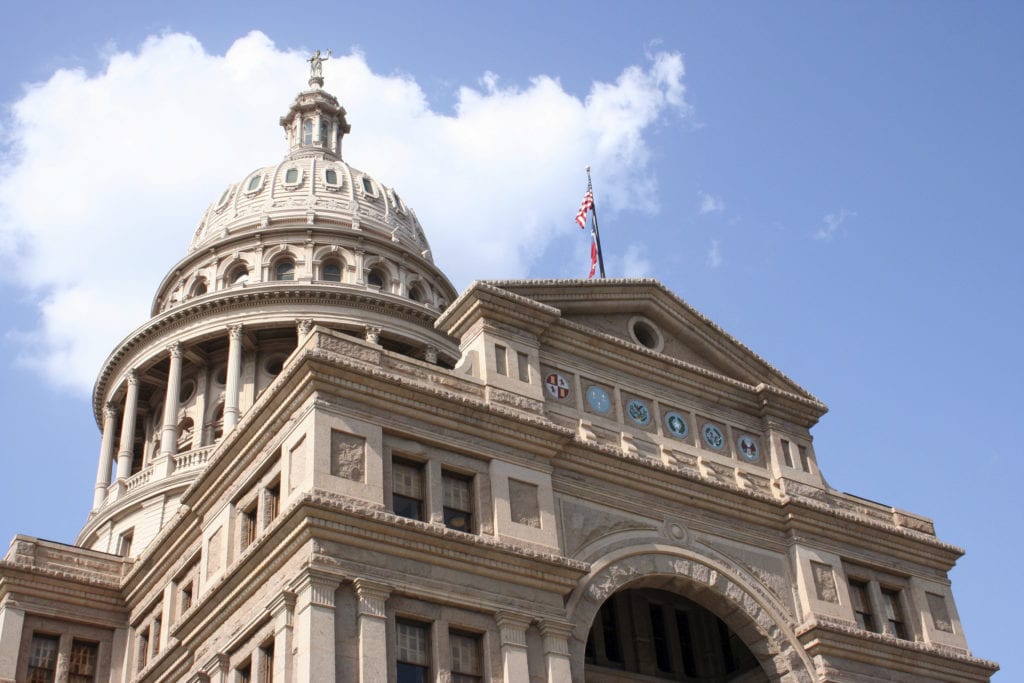
Return to March 2020 newsletter
Update March 20: Texas Governor Greg Abbott has postponed the May 26 primary runoff elections until July 14 because of the coronavirus threat.
Around the Texas Capitol: Coronavirus quiets the Capitol; Super Tuesday analysis
By Shayne Woodard, J Pete Laney and Lauren Spreen
TAD Governmental Affairs
While the Texas Capitol is always quiet during a legislative interim and after primary elections, the halls are particularly silent right now due to the coronavirus impact. As of 8 a.m. March 18, the Capitol is closed to the public.
Prior to that, public tours had been suspended, legislative interim hearings called off, some offices closed as employees began working from home, and Speaker Dennis Bonnen Speaker canceled all non-legislative gatherings in the House chamber, hearing rooms, and an adjoining state office building.
On Friday, both President Trump and Gov. Greg Abbott issued disaster declarations for both the nation and the state, setting up the ability to free up state and federal resources to deal with the spread of COVID-19.
Outside the Capitol, the campaign season continues, with eye to May 26 runoff elections, in some cases. Candidates are trying to figure out the best way to get their message out in this coronavirus age. For example: how do you connect with voters if you are avoiding risky behaviors such as going door-to-door or shaking hands? The Texas Tribune recently provided a look at some of the alternatives candidates are adopting.
Will we even have runoff elections on May 26? Some media report that election officials are having preliminary conversations about the potential of doing vote-by-mail ballots only for the runoffs, which would be a first in Texas history.
The governor already has delayed from May 2 to July 14 a special election for Senate District 14, vacated with the recent resignation of State Sen. Kirk Watson (D-Watson).
Before the Texas Capitol was essentially shut down, the Texas House Public Health Committee on March 10 held a five-hour hearing on the state’s coronavirus preparedness. The committee heard from experts including education officials, local officials from San Antonio and Houston, pharmaceutical experts and health care professionals.
It was a whirlwind week; at the Capitol, like the rest of our country, much changed. And things can quickly change. We are continuing to monitor any developments on the state legislative or regulatory level that could impact the state’s dairy industry.
Super Tuesday analysis
The 2020 Super Tuesday primary was as exciting as expected, with the highest voter turnout in recent years. Texas races brought a few surprises, but for the most part, challenged incumbents easily won their respective primaries.
More than four million Texans cast votes in the primary, which marks 25% statewide turnout of registered voters and the first primary in Texas history to draw two million votes in both Republican and Democrat primaries. Democrats had slightly higher turn out with less than a single percentage point more overall.
President Trump’s nearly two million votes in this year’s already settled Republican presidential primary is a major positive indicator of Republican enthusiasm. As a comparison, President Obama collected 500,000 votes in the 2012 primary. That’s pretty impressive enthusiasm.
Texas Democrats look like a different party now, too. Long-term demographic trends, sustained voter registration and engagement efforts, and persistent inbound migration from “blue” states add up to make this the most competitive Texas election cycle in recent history. National Democratic money started pouring into Texas ahead of the primaries, and it will continue. Texas is growing into a real battleground state.
Many political pundits are talking about the following:
- Democrats could win a statewide office in Texas for the first time since 1994. Due to a variety of incomprehensible factors, Railroad Commissioner Ryan Sitton, with $2.3 million left in the bank, lost his primary by 200,000 votes to a political unknown, Jim Wright, who has 200 Twitter followers and a $20,000 campaign spend. Chrysta Castaneda leads Roberto Alonzo into a runoff to determine the Democratic nomination.
- At least nine Texas Congressional districts are being contested across the state, with most having the potential to add to Nancy Pelosi’s Democrat congressional majority.
- Texas House Democrats will very likely add seats in the Texas House, but will fall short of the nine needed to win the Speaker’s gavel.
- A possible one seat pickup by Democrats in the Texas Senate (SD-19, Pete Flores) would eliminate a major procedural advantage Republicans now enjoy.
- Neither party will benefit from straight ticket voting in November, which is no longer an option at the ballot box in Texas as of this election cycle. That’s a big X factor for both parties.
As far as the Legislature, 38 House members and three Senators escaped without a primary or general election opponent and thus will be returning to the Texas Capitol.
The Texas House is where most of our political class’s attention is concerned. Democrats are excited about primary turnout numbers in many of the swing House districts. In most of the districts that will be in play this November (about 12 districts), Democrats outvoted Republicans. The trend line continues to demonstrate Republican weakness in urban and suburban counties, a downside for many down ballot Republicans.
On the Republican side of the House, there were 27 contested primary races with 11 incumbents challenged. No incumbent lost his/her primary election; however, two respected House Republicans are heading to runoff elections.
Rep. Dan Flynn (R-Van), who chairs the Defense and Veterans Affairs Committee, and Rep. J.D. Sheffield (R-Gatesville), vice chair of Public Health and a member of the Appropriations Committee, did not receive more than 50% of the vote. In a three-person primary, Flynn came in first place with 45% of the vote, and will face businessman Bryan Slaton, who has run for the seat twice before. Slaton narrowly lost to Flynn in the 2018. In House District 59, Sheffield came in second place with 30.4% of the vote to Shelby Slawson, who received over 45% of the vote.
In the Democratic primary, 36 contested House seats were up for grabs with 19 incumbent members facing opponents. Of the incumbents, 17 won their primaries, one race was forced into a runoff and one race is still too soon to call.
Rep. Lorraine Birabil (D-Dallas), who won a special election in late January to represent House District 100, will face Jasmine Felicia Crockett in a runoff. Rep. Harold Dutton (D-Houston) almost pulled off a victory in House District 147. Dutton has served in the Legislature for 35 years, and faced three primary opponents. Although Dutton received close to 50% of the vote, he will face Houston City Council member Jerry Davis in a runoff. In another closely watched race, Rep. Alex Dominguez (D-Brownsville) defeated former Cameron County Democratic Party Chair Amber Medina in House District 37. Dominguez won with 51.4% of the vote.
The Texas Senate also had a few keys races to watch. There were no open seats in this election cycle and none of the Republican senators who were up for re-election had primary opponents. In fact, there was only one Senate Republican primary in heavily-Democratic Senate District 13, which is currently represented by Sen. Borris Miles (D-Houston).
There were, however, two major races in the Democratic primary. Sen. Eddie Lucio, Jr. (D-Brownsville), who has long represented the Rio Grande Valley in the Texas Legislature, faced two challengers, Brownsville attorney Sara Stapleton Barrera and former State Board of Education member
Ruben Cortez. Barrera and Cortez both received some big endorsements and forced Lucio into a runoff. Lucio fell 137 votes shy of winning his primary outright. He received 49.8% of the vote while Stapleton Barrera received 36% and Cortez received 14%. Lucio will face Stapleton Barrera in the May runoff.
Democrats are fighting to regain Senate District 19, which stretches from the south side of San Antonio west to Ft. Stockton. Republican Sen. Pete Flores (R- Pleasanton) won a special election in this district after Democrat Sen. Carlos Uresti was convicted and sentenced to 12 years in prison. Flores is the first Republican to represent this district in 139 years, and Democrats are trying to take back the seat. Three candidates ran in the Democratic primary. The front-runners leading up to Tuesday’s election were Rep. Roland Gutierrez (D-San Antonio) and Xochil Rodriguez, daughter of former Congressman Ciro Rodriguez. Ultimately, neither received 50% of the vote and they will have to go to a runoff election.
It’s a long way from here to November, but it’s hard to see now how Democrats could fail to add a few seats this fall. It’s almost equally hard, though, to count to the nine seats it would take for them to take control of the Texas House. They’ll also have to defend the 12 seats they added in 2016, four of which will be pretty hotly contested.
The primary runoffs — as of now — will be held May 26. Texas’ general election will take place Tuesday, Nov. 3.
For a complete list of election results, please visit the Texas Secretary of State’s website.


